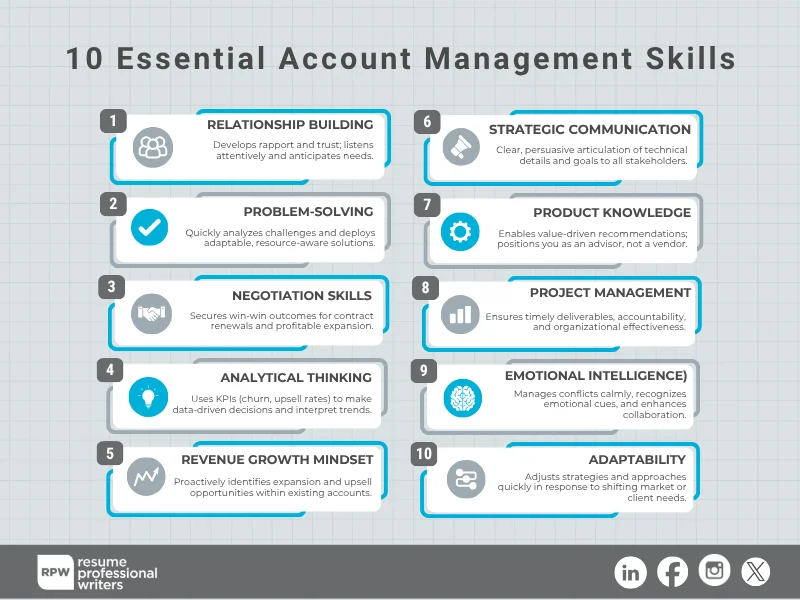The realm of account management is becoming a bustling marketplace. Standing out is no longer just an option; it’s a necessity. For professionals targeting account management roles, it is pivotal to illuminate their unique account management skills that employers crave. Without clearly communicating these strengths, candidates risk being overlooked in this highly competitive field where hiring managers value both technical and interpersonal excellence.
This resource is tailored for professionals pursuing careers in account management, including those transitioning from sales, marketing, or customer service, as well as executives seeking leadership positions. It explores the essential account management skills employers prioritize, how these skills impact client outcomes, and strategies for highlighting them effectively on resumes and in interviews. Mastering these account management skills will help job seekers strengthen their career prospects while positioning themselves as indispensable assets to employers.

What Makes Account Management Skills a Critical Business Function?
Account management serves as the bridge between an organization and its clients. Unlike short-term sales transactions, account managers focus on cultivating long-lasting partnerships that generate recurring revenue and improved client satisfaction. Candidates possessing effective account management skills greatly contribute immensely to:
- Client Retention: According to LinkedIn’s Future of Skills report, relationship management ranks among the most in-demand soft skills employers seek, reflecting its central role in organizational success. The role requires balancing client needs with company objectives. While sales professionals may close deals, account managers ensure client success by monitoring performance, addressing concerns, and providing tailored solutions. This dynamic emphasizes the strategic value of account managers, who drive retention rates, cross-sell opportunities, and customer lifetime value.
- Increased Revenue: In sectors such as IT, finance, and marketing, where ongoing service delivery is integral, account managers are seen as advisors rather than transactional liaisons. They demonstrate the ability to think critically and adapt solutions to evolving client needs in order to satisfy clients and drive them to purchase additional products or services.
- Brand Advocacy: Strong account management not only reduces churn but also enhances the company’s reputation by fostering client trust. For career professionals, developing targeted skills in this field establishes clear pathways for advancement into leadership, consulting, or executive-level business development roles.
10 Essential Account Management Skills Every Professional Needs
- Relationship Building – Account managers succeed by developing trust and rapport with clients. Employers seek individuals who listen attentively, respond consistently, and anticipate customer expectations. Strong client relationships increase retention, which directly impacts profitability and long-term contracts.
- Strategic Communication – Clear and persuasive communication across email, presentations, and meetings is key. Account managers must balance technical detail with accessible language to ensure both internal stakeholders and clients understand progress and goals.
- Problem-Solving – Clients often encounter challenges that require immediate solutions. Successful account managers analyze situations quickly, collaborate with relevant teams, and deploy adaptable strategies that meet the client’s needs without compromising organizational resources.
- Product and Industry Knowledge – Understanding the company’s offerings and industry landscape enables account managers to provide relevant, value-driven recommendations. This knowledge builds client trust and allows professionals to act as advisors rather than vendors.
- Negotiation Skills – Whether securing contract renewals or cross-selling products, negotiation is essential. Effective account managers find solutions that balance organizational profit margins with client satisfaction, ensuring win-win outcomes.
- Project Management – Managing timelines, deliverables, and cross-departmental teams helps ensure commitments are met. Strong project management abilities demonstrate accountability and organizational skill, both of which earn client confidence.
- Analytical Thinking – Measuring account performance through KPIs such as retention, churn, or upsell rates allows account managers to make data-driven decisions. Employers value professionals who can track, interpret, and act on trends.
- Emotional Intelligence (EQ) – Clients respond positively to account managers who recognize emotional cues, remain calm under stress, and manage conflicts effectively. EQ enhances collaboration while making interactions more positive and productive.
- Revenue Growth Mindset – Beyond maintaining current accounts, account managers must identify opportunities for expansion. Leveraging cross-selling and upselling requires the ability to align business needs with client goals.
- Adaptability – With shifting markets and evolving client expectations, adaptability is crucial. Account managers who embrace flexibility and adjust their strategies remain valuable during periods of uncertainty or organizational restructuring.

How to Showcase Account Management Skills on a Resume
To stand out in this competitive field, professionals must effectively showcase their aacount management skills and other relevant abilities on their resumes. Here are some strategies:
- Quantify Achievements: Resumes that highlight account management skills effectively integrate measurable results and industry-specific language. Employers scanning applications through Applicant Tracking Systems (ATS) prioritize candidates who demonstrate both role-specific expertise and quantifiable impact. Strategic keyword placement often determines whether applications succeed in passing automated filters.
- Demonstrate Tangible Results: Rather than listing skills in isolation, job seekers should illustrate how account management skills led to significant outcomes. Examples include improving retention rates, increasing client satisfaction scores, or generating revenue growth through value-driven account strategies. Including metrics—such as retention percentages, growth percentages, or contract renewal timelines—strengthens credibility and distinguishes candidates from competitors relying solely on generic descriptions.
- Integrate Hard and Soft Skills: Additionally, resumes should reflect a blend of hard and soft skills. For instance, combining proficiency in project management software with strong interpersonal communication demonstrates versatility. Tailoring resumes to align with industry priorities such as healthcare compliance, IT systems integration, or financial portfolio expansion shows employers a customized fit.
Training, Certifications, and Tools Enhancing Account Management
Many employers prefer or require professionals with certifications that validate account management skills. These credentials not only enhance resumes but also deepen credibility with clients and colleagues. Here are some key areas to consider:
- Certifications: Industry-recognized options such as Certified Professional Sales Leader (CPSL), Strategic Account Management Association (SAMA) certification, or training programs in customer relationship management (CRM) systems such as Salesforce or HubSpot.
- Training Opprtunities: Job seekers also benefit from training in data analytics, presentation skills, and negotiation strategy to reinforce their core capabilities.
- Technical Tools: Mastery of CRM tools enables account managers to track client needs accurately, forecast trends, and produce detailed reports necessary for executive decision-making. As more organizations incorporate AI-driven analytics into client interactions, candidates displaying both technical adaptability and human-centered skills hold competitive advantages
Investing in training and certifications demonstrates a commitment to career growth. Employers interpret continuous learning as an indicator that professionals embrace evolving practices and maintain relevance in shifting industries. Combining formal credentials with practical achievements creates stronger positioning for promotions or senior-level career opportunities.
Career Outlook for Account Managers
The career trajectory for account managers is strong across the United States, particularly in industries that rely heavily on client retention and recurring revenue. According to the U.S. Bureau of Labor Statistics, employment in advertising, marketing, promotions, and related fields is projected to grow steadily. Combined with the expanding importance of digital platforms and subscription-based business models, the demand for effective account management skills continues to rise.
Salary ranges vary based on factors such as geographic region, industry specialization, and level of responsibility. For example, account managers in technology sectors may earn significantly higher compensation than those in nonprofit organizations due to revenue-driving expectations. Senior account managers and directors also benefit from performance-based incentives tied to retention, cross-selling, and customer satisfaction outcomes.
Growth opportunities in account management extend into executive titles such as Client Services Director, Business Development Director, or Vice President of Customer Success. Many account managers also leverage their experience into entrepreneurship, consultancy, or leadership in customer-facing organizations. This profession attracts individuals with both strategic insight and people-focused ambition, making it one of the most dynamic career pathways in the current job market.

Master Skills That Drive Client and Career Success
Success in account management depends on the ability to balance trust-building, analytical thinking, and long-term strategy. By cultivating communication, negotiation, and adaptability as core strengths, job seekers align with the exact qualities employers are eager to find.
Standout resumes and interview stories are often the deciding factor in securing high-value opportunities, and many professionals accelerate their advancement by investing in ATS-friendly resume writing services that amplify their strengths and meet employer priorities. Invest in your future by mastering your account management skills today!
Frequently Asked Questions
What are the most important account management skills?
The most important account management skills include relationship building, communication, problem-solving, negotiation, and project management. These strengths enable professionals to retain clients, generate revenue growth, and maintain a competitive advantage for employers.
How can job seekers highlight account management skills on a resume?
Job seekers should integrate measurable achievements, such as improving client retention percentages or expanding accounts through upselling. Including both soft skills and technical expertise, like CRM platform knowledge, ensures resumes align with employer expectations.
Are certifications necessary for account management careers?
While not mandatory, certifications like SAMA membership or CRM training strengthen credibility and appeal to employers. Credentials signal commitment to professional development and equip candidates with specialized knowledge.
What is the career outlook for account managers?
Account management is a high-demand career with growth across technology, healthcare, finance, and marketing sectors. Rising client retention needs in subscription-based business models drive increased opportunities and higher compensation for professionals who excel in this field.
How do account managers differ from sales representatives?
Sales representatives focus on closing deals, while account managers manage relationships after contracts are signed. Account managers emphasize client satisfaction, retention, and revenue growth, making them key to long-term business success.








